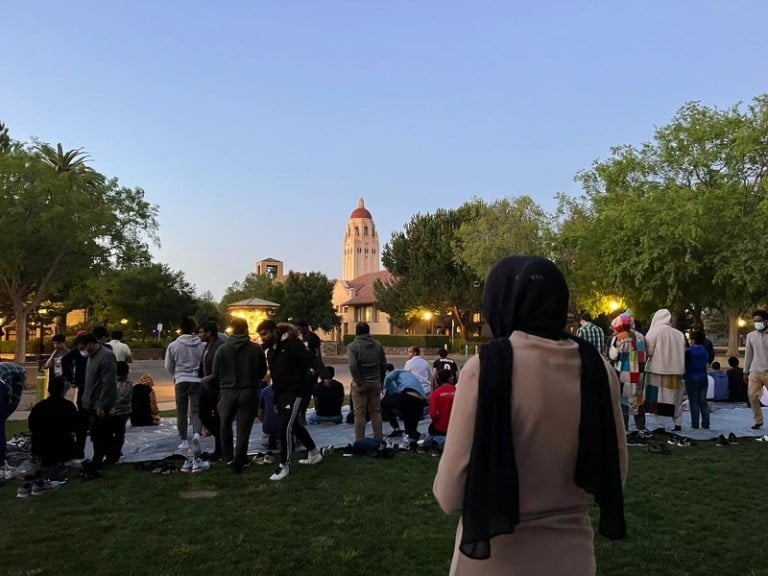During April, some Muslim students at Stanford celebrating Ramadan fasted from sunrise to sunset, engaging in prayer and reflection. Despite facing challenges, Muslim students said they found gratitude and community throughout the month’s observance.
As the sun set each day, Muslim students gathered at Old Union for Iftar. Volunteers passed out food brought by the Markaz and Muslim Student Union (MSU), and students talked and ate in groups, breaking their fasts together.
“Ramadan is a really special thing for me and other Muslims,” said Afnaan Hishami ’24. “It’s not about how long you can go hungry for or thirsty for, but it’s about being grateful for what you have and having a chance to become more spiritual.”
For many students, this marked their first time celebrating Ramadan away from home.
“Ramadan is very difficult, especially here,” said Faris Bdair ’24. For Bdair, much of the difficulty stems from “being in college and away from your family, especially during this month.”
In the place of celebrating with family, many students have found community through campus-wide events hosted by the MSU.
Still, many Muslim students said they encountered challenges due to the limited hours during which Suhoor and Iftar meals were made available. According to signs posted in dining halls, they were exclusively available at Arrillaga Family Dining Commons and Lakeside Dining from sunset to 9 p.m.
Though grateful for the food offered, Hishami said that the “small window” to pick up a Suhoor bag from the dining halls has sometimes left him unable to grab a bag due to time conflicts and physical inconveniences. Other Muslim students echoed the desire for a longer time frame to pick up food.
Residential and Dining Enterprises (RD&E) spokesperson Jocelyn Breeland wrote in a statement to The Daily that RD&E collaborated with Muslim students and the Office of Religious and Spiritual Life to form a student committee that “provided input on what foods Stanford Dining should provide for the Suhoor bags and what foods would be featured for the weekly Iftar specials in Arrillaga Family Dining Commons and Lakeside dining halls.” Breeland did not address student criticism regarding the provided time period to pick up Suhoor bags.
“We have received nothing but positive feedback from students on this year’s Ramadan programs in Stanford Dining,” Breeland wrote.
“Midnight Breakfast was extremely helpful for everyone,” Bdair added. “I know it’s not feasible to have it everyday, but it was perfect timing for us because it allowed us to eat and go to bed at a reasonable time.”
Problems with quantities of food added on to challenges with timing. Lara Hafez ’24 wrote in a statement to The Daily that she wished there was “more funding for daily Iftars,” as sometimes there was not enough food for volunteers to eat.
Noting an increase in student participation in the Ramadan program, Breeland expressed that the number of students taking advantage of the accommodations doubled compared to last year’s participants. “We understand the importance of this holy month to Muslim students which is why we’ve worked hand-in-hand with students and ORSL to design accommodations that support students’ needs.”
Breeland also referenced R&DE’s efforts to accommodate the dietary needs of Muslim students. “We are also working on an ambitious project to add a halal icon to the menu labels in the dining halls, reviewing each of our 3,500 recipes to identify which items are halal. We plan to launch the new labels in Fall 2022,” she wrote.
Because they often eat meals before sunrise prior to fasting, some students have experienced academic difficulties due to a lack of sleep.
“I have faced a lot of challenges in Ramadan, especially with midterms happening this month,” said Rifat Emam ’24. “Although [the University] is helping us a lot, I think it would be very helpful if we had the option to not take midterms during Ramadan or delay them a little bit.”
Though Emam usually sleeps nine hours a night, he has been getting an average of three hours during Ramadan. “I have to do my homework and [ensure] that I attend prayers,” Emam said. “My mental well-being has gotten worse but this is all making me stronger.”
For both Emam and Bdair, however, their professors have granted accommodations for Ramadan, including for students who have to miss class. In a written statement to The Daily, University spokesperson E.J. Miranda addressed academic accommodations for Ramadan. “We appreciate the challenges Muslim students may face during Ramadan,” Miranda wrote. “We continue to encourage students to speak with their instructors and work with them when there is a religious obligation that may hinder their classwork, as described in these recent messages to the community.”
Miranda also added that faculty can reach out to the Office for Religious and Spiritual Life for any questions about academic accommodations during Ramadan or other religious observances.
In spite of these challenges, students said they appreciated the support from the University, as well as the connections forged with the broader Muslim community at Stanford. Praising the MSU, Bdair said, “I am very thankful for everything that they do and the amount of work they do behind the scenes is amazing.”
Students involved in the MSU also said that they found this work to be rewarding.
Ronnie Hafez ’25, who served as this year’s MSU Ramadan Director and was responsible for organizing nightly Iftars, said that “spending Ramadan with the Stanford Muslim community this year has truly been a blessing, and the beauty of the work that goes into Ramadan is truly special.”
“Seeing the growth of the community has been beautiful, and I am happy to have found a home within the community,” he added.
This article has been updated to include a statement from the University about academic accommodations during Ramadan.
